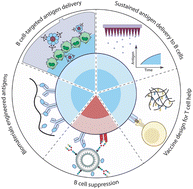Biomater. Sci., 2024, 12,1981-2006
DOI: 10.1039/D3BM01841E, Review Article
DOI: 10.1039/D3BM01841E, Review Article
 Open Access
Open Access This article is licensed under a Creative Commons Attribution-NonCommercial 3.0 Unported Licence.
This article is licensed under a Creative Commons Attribution-NonCommercial 3.0 Unported Licence.Ali Zareein, Mina Mahmoudi, Shruti Sunil Jadhav, Joel Wilmore, Yaoying Wu
Biomaterials enhance B cell immunity by modulating the delivery approach, crosslinking B cell receptors, and promoting T cell help, while inhibitory co-receptor engagement via biomaterial design suppresses B cell function.
The content of this RSS Feed (c) The Royal Society of Chemistry
Biomaterials enhance B cell immunity by modulating the delivery approach, crosslinking B cell receptors, and promoting T cell help, while inhibitory co-receptor engagement via biomaterial design suppresses B cell function.
The content of this RSS Feed (c) The Royal Society of Chemistry

